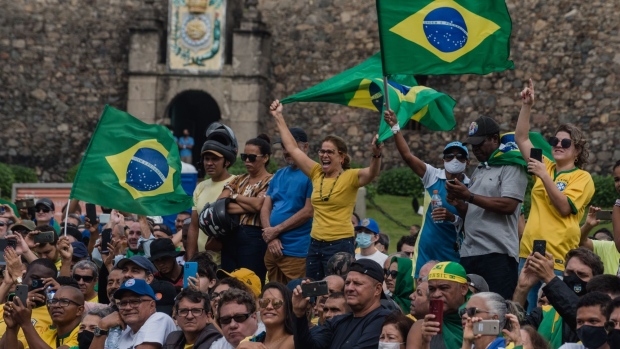Oct 3, 2022
Pollsters Fail to Capture Bolsonaro Support Again in Brazil Vote
, Bloomberg News

(Bloomberg) -- Four years later, Brazilian pollsters once again underestimated support for Jair Bolsonaro.
In Sunday’s election, the right-wing president received about 43% of the votes, propelling him to an Oct. 30 runoff against heavy favorite Luiz Inacio Lula da Silva, who took over 48% of votes.
That result was well above the figures projected by two of Brazil’s most closely followed pollsters Datafolha and Ipec who expected Bolsonaro to get 36% and 37%, respectively, when removing null and blank votes in the first round. And they indicated there was a real chance of Lula winning outright.
In 2018, Bolsonaro, 67, rose from the fringe of congress to the nation’s top job on a shoestring budget, flouting the airwaves and traditional campaign methods while dominating social media. Pollsters failed to fully capture his support in their numbers. This time around, however, surveys were accurate in projecting Lula’s support.
“We prevailed over the lies,” Bolsonaro told reporters Sunday evening in Brasilia, in reference to the polls.
Bolsonaro and his allies often try to discredit pollsters. They claim, without evidence, that survey firms are in the pocket of certain media groups and out to turn the public against the president.
There are many reasons an opinion survey could fail to gauge the real support for Bolsonaro. Fervent followers could refuse to talk to pollsters they don’t trust, more moderate supporters might be embarrassed to say they back the often-crass leader, or there may have been last-minute decisions to change a vote from a candidate that was running far behind the front-runners.
Sunday evening, Bolsonaro’s chief of staff Ciro Nogueira, called on supporters to not speak to polling companies ahead of the runoff.
“After the scandal that they committed, President Bolsonaro’s voters only have one answer for polling companies: DON’T RESPOND TO ANY OF THEM UNTIL THE ELECTION IS OVER!!!,” he wrote on his Twitter account.
Andrei Roman, head of polling firm AtlasIntel, says many survey companies botched their calls on Bolsonaro, in part, because they over estimated the amount of poor voters, who tend to support Lula. Brazil has not conducted a census since 2010, leaving pollsters to come up with estimates for representative samples of things like religion and household income that best reflect the electorate.
“The samples were always wrong, they were inflating the poor,” Roman said. “Even we underestimated Bolsonaro.” The last Atlas poll projected Bolsonaro to receive just over 41% of the valid votes against more than 50% for Lula.
The surveys also undershot his ability to transfer support in local races. Bolsonaro has shown his backing makes a big differences for candidates for senate, governor and congress, Oliver Stuenkel, a professor of international relations at the Getulio Vargas Foundation in Sao Paulo, wrote on Twitter.
Some of the biggest botched calls of the evening came in the state of Sao Paulo, the most populous, where Fernando Haddad, Lula’s Workers’ Party candidate for the presidency last election, was the favorite to take the governorship. He finished nearly seven percentage points behind Bolsonaro’s former Infrastructure Minister Tarcisio de Freitas, with the two heading to a runoff. Similarly, in the state’s senate race, former astronaut and Bolsonaro’s ex-Science Minister Marcos Pontes clinched an unexpected victory.
In the southern state of Rio Grande do Sul, Bolsonaro’s former Vice President Hamilton Mourao surprised and trounced the Worker’s Party candidate in the senate contest. The incumbent’s ex-Human Rights Minister Damares Alves also won a senate seat in the capital, Brasilia.
(Adds chief of staff’s comments in eighth paragraph.)
©2022 Bloomberg L.P.







